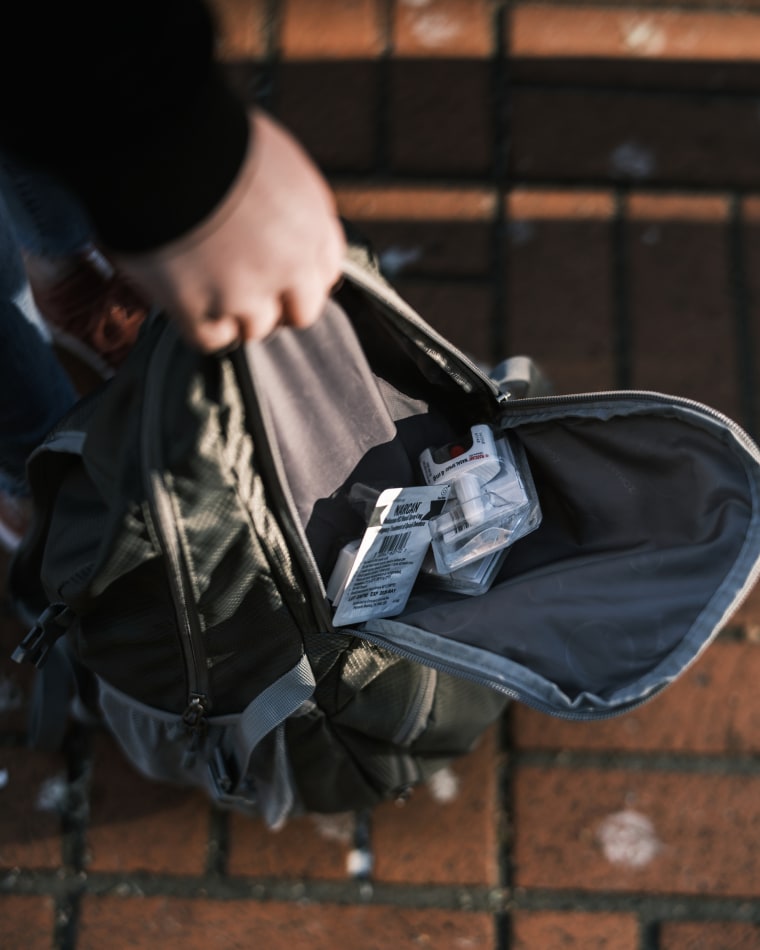PORTLAND, Ore. — The war on drugs, once a weapon in the nation's fight against substance abuse and related crimes, is making a comeback on the West Coast.
Fueled by increasingly visible signs of homelessness and drug use in Oregon and San Francisco, officials are restoring punitive measures for drug-related offenses amid a worsening fentanyl crisis. The laws are meant to rein in dangerous street drugs and curb their use on public sidewalks and parks, but advocates say they will only fill jails with people who need treatment.
The change comes after California and Oregon initiated criminal justice reforms aimed at reducing prison populations in recent years. Critics say the new laws will overwhelm the criminal justice system and lead to more overdose deaths and poverty.
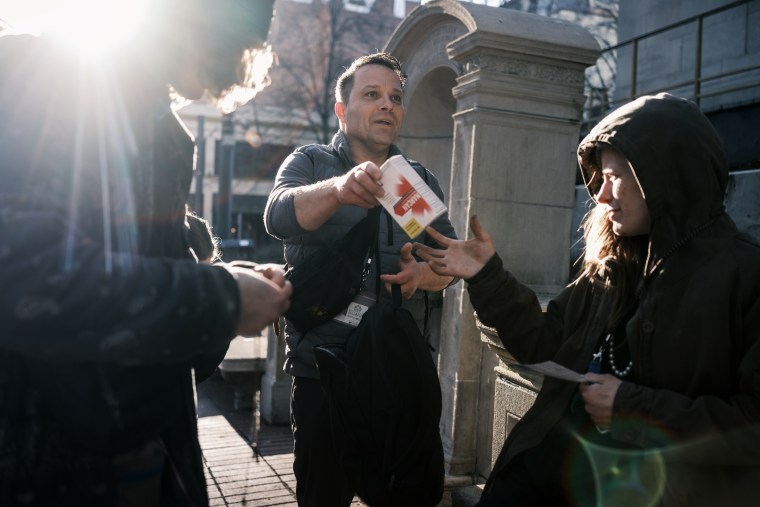
“The crisis of homelessness combined with fentanyl has made people feel like something has to be done,” said Mary Sylla, director of overdose prevention policy and strategy at the National Harm Reduction Coalition, a public health advocacy group based in New York.
Reviving the drug war, a policy President Richard Nixon initiated in 1971 to disrupt the international drug trade, “is a knee-jerk reaction,” Sylla said. The approach failed, in part, because it eschewed treatment and focused on citations and arrests.
Gary McCoy, spokesperson for the San Francisco-based nonprofit organization HealthRight360, said, "The answer shouldn't be 'Let’s do the thing we did 10 to 20 years ago and didn’t work but at least we look tough.'"
Oregon overdose rates climb
Skyrocketing overdose rates prompted Oregon Gov. Tina Kotek to declare a 90-day emergency in downtown Portland this year. Five weeks later, Oregon lawmakers overwhelmingly passed a bill reversing decriminalization efforts.
The number of overdose deaths increased 533% from 2018 to 2022 in Multnomah County, which includes Portland, according to county data. Overdose numbers for last year are not yet available.
In San Francisco, shopping carts and discarded tinfoil packets bearing burn marks litter the Tenderloin district, ground zero for the opioid epidemic. Last year, 813 people in the city died from accidental overdoses, up from 647 in 2022, according to the chief medical examiner’s office.
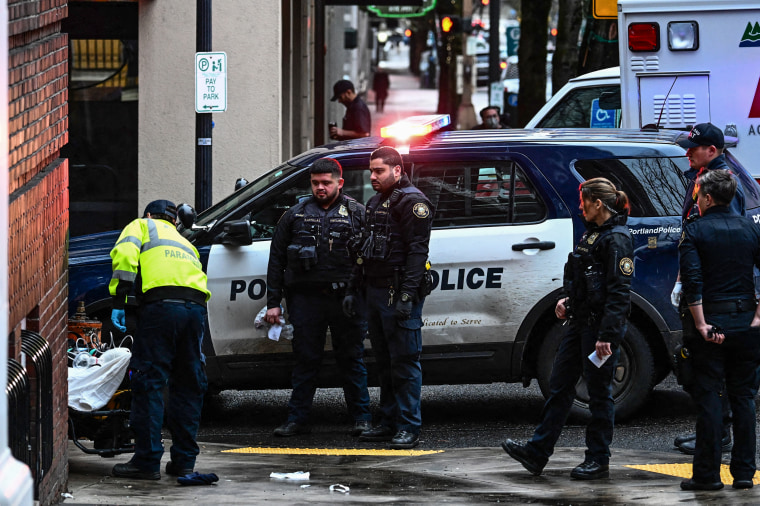
Voters indicated they had had enough on March 5 when they approved a ballot measure to screen and enroll in treatment welfare recipients who are suspected of using drugs.
“There’s a lot of drug abuse on our streets, and it manifests itself on lots of issues from public safety to quality of life,” San Francisco voter Charley Goss told NBC Bay Area.
The shift toward criminalization in a region that spearheaded reforms comes amid a national narrative expounded by conservative media and politicians that paints urban centers as crime-ridden dens of despair. A Gallup Poll in December found that 77% of Americans believe crime rates are worsening, while federal data shows dips in violent and property crimes.
The reality is much more complicated, according to front-line service providers and drug reform advocates.
“This is classic scapegoatism,” said Victor Gresser, a San Francisco-based mental health counselor. “This is classic discrimination and stigmatization.”
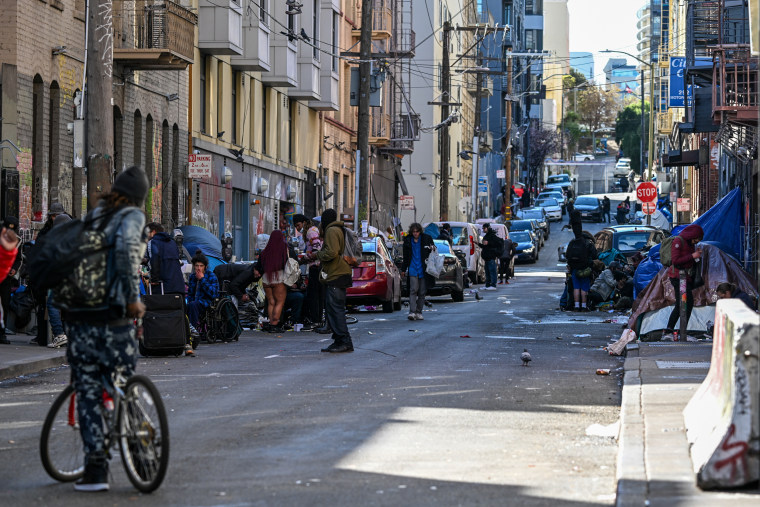
Crime rates fall
Despite the rise in overdose deaths, crime rates have fallen since 2020. Overall crime dropped in San Francisco by 7% in 2023 from the previous year, and violent crime was down 11% from pre-pandemic levels, according to the city.
In Portland, violent crime fell 4% last year compared to 2022, along with a 22% drop in overall shootings, according to the Portland Police Bureau.
After the pandemic shuttered many urban centers, unsheltered residents became more visible as many white-collar workers stayed home.
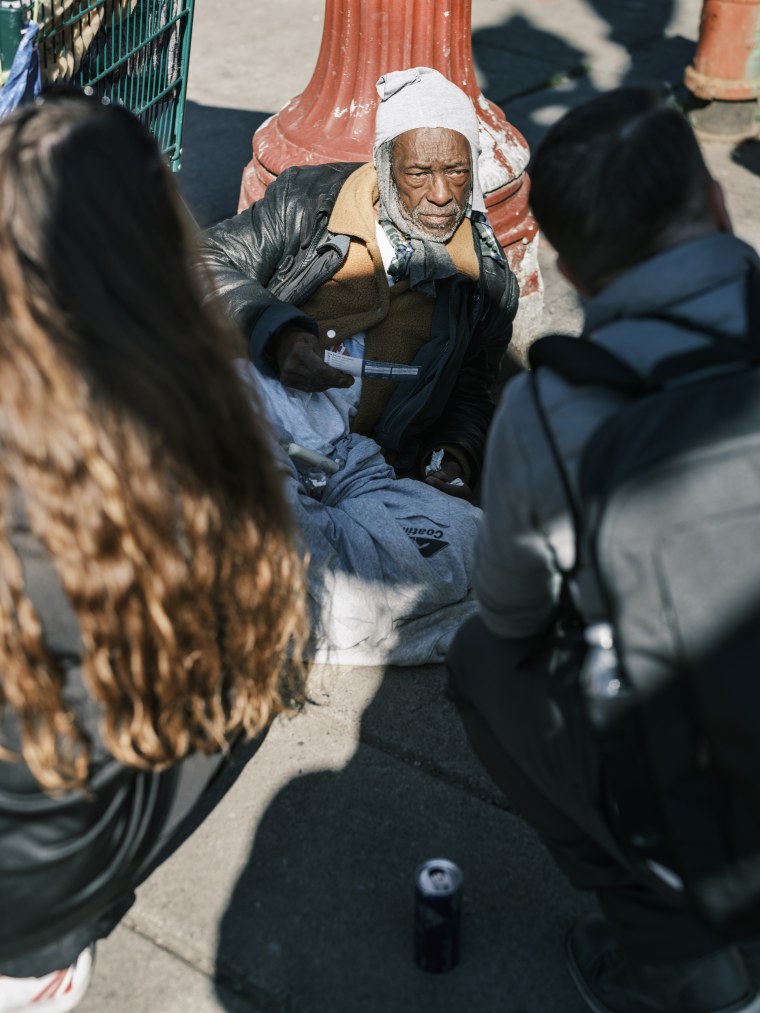
About 7,754 San Franciscans experienced homelessness in 2022 compared to 8,035 in 2019, the last time the city conducted a federally mandated count.
Homelessness in Portland increased by 65% from 2015 to 2023, from 1,887 people to 6,297, according to the latest figures.
Just as the pandemic was upending life for millions of people, fentanyl hit the Midwest after its introduction on the East Coast, and it spread to the West Coast starting around 2020.
To combat the crisis, state lawmakers passed a bill this month to end a three-year experiment that made Oregon the first and only state to decriminalize small amounts of hard drugs.
Less than a week later, the San Francisco ballot measure passed.
"We can do better by people," said Trent Rhorer, executive director of San Francisco's Human Services Agency, which will carry out the new initiative when it takes effect in January. "Why is the goal to keep someone alive? The goal should be get them into recovery, kick this horrible habit."
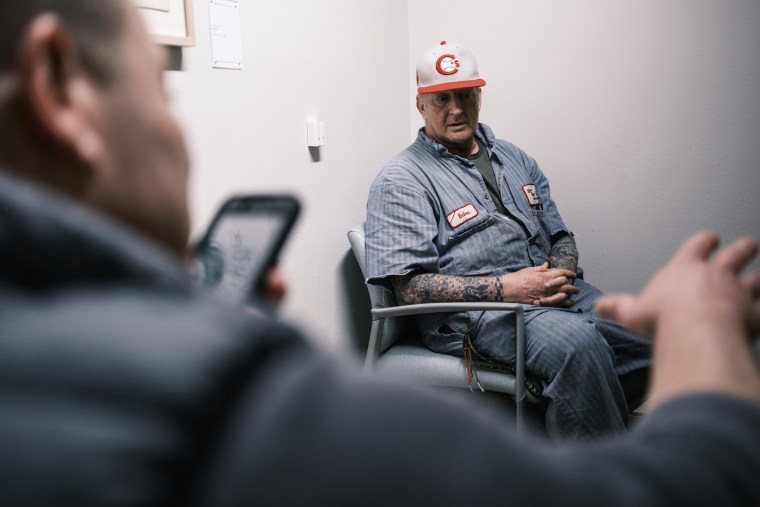
But recovery can be slow for people struggling with addiction. Many cycle in and out of jail and treatment before they get sober. Preventing deaths through public health services is a much more attainable goal, drug reform advocates said.
“We’re only going to see a cycle of despair if we continue criminalization,” said Emily Kaltenbach, senior director of state advocacy and criminal legal reform at the Drug Policy Alliance, a nonprofit group that supported Oregon’s decriminalization measure.
Decriminalization passes in Oregon
Oregon voters overwhelmingly passed the decriminalization measure in 2020 as an answer to rising addiction and overdoses. The initiative, known as Measure 110, reduced penalties for possessing small amounts of hard drugs and established a framework to help people access treatment services.
Advocates intended for hundreds of millions of dollars of cannabis tax revenue to go into drug treatment and harm reduction programs, but the framework was slow to roll out. Less than three years after funding was first provided to organizations, lawmakers passed the bill to reverse Measure 110.
“It’s a politics bill, not a policy bill,” said Tera Hurst, executive director of the Oregon Health Justice Recovery Alliance. “People don’t like seeing people doing drugs on the streets, but they’re doing drugs on the streets because they don’t have a home.”
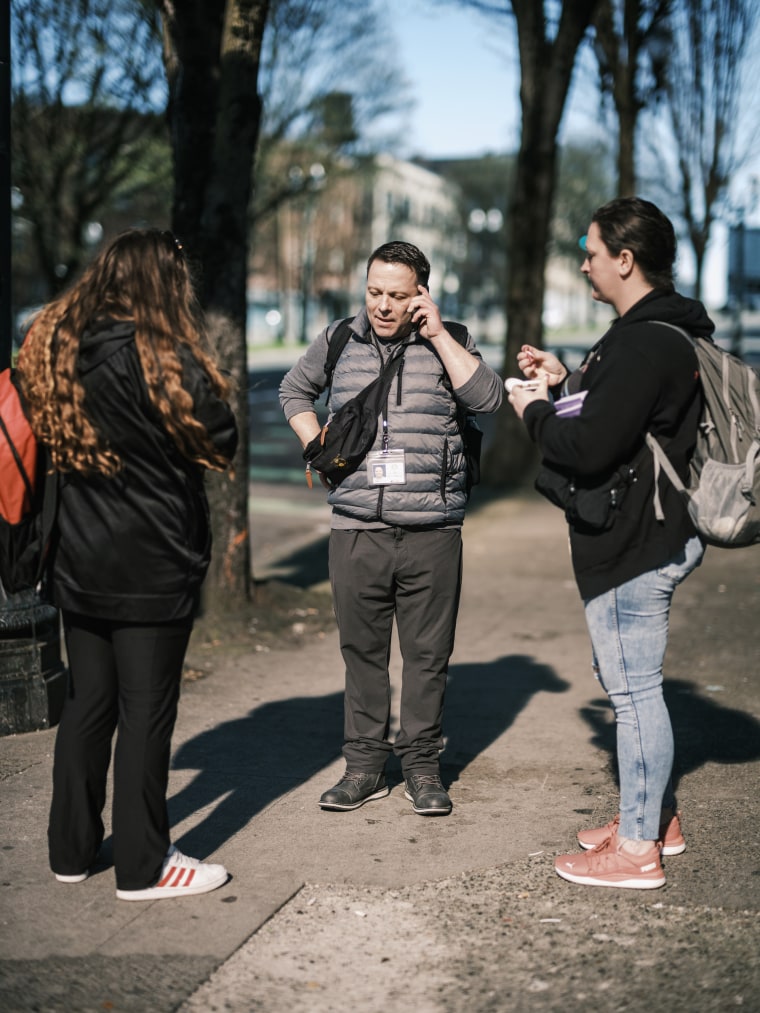
Frustrated by what she said was a lack of political will to fully implement Measure 110, Hurst found an unlikely ally in a Portland police officer who was tired of watching the opioid crisis ravage the city.
They formed an informal collective of drug treatment centers, medical and health care providers, lawyers and police officers that meets several times a month in a county office in downtown Portland.
On a cold March morning, more than two dozen volunteers crammed into the room to coordinate outreach plans for the day. Neatly piled boxes of Narcan and small bags of toiletries sat on the conference room table.
A representative from each organization listed available resources for anyone needing medical attention or a detox bed. The group divided into teams and fanned out through the city to offer services or help as needed.
By 2:45 p.m., at least two people had been sent to detox centers.
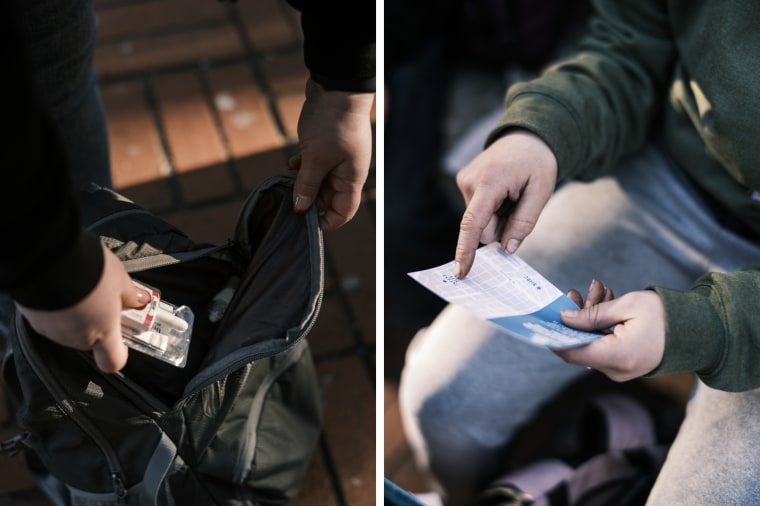
“We should have been doing this two years ago,” said Portland Police Officer David Baer, who helped establish the collective with Hurst last year.
Many of the volunteers who participate in the group once struggled with addiction. The biggest hurdles to helping others get sober are stigmatization and marginalization, they said, and peer outreach is paramount to build trust rather than coerce people into treatment through the criminal justice system.
“We’re rewriting the narrative that these people don’t want help,” said John Karp-Evans, senior program and operations director at the nonprofit Behavioral Health Resource Center.
Since 2022, Measure 110 helped fund 233 providers across Oregon, according to a state audit last year. Providers reported spending just over a third of grant funds because they had difficulty hiring staff members.
It was too soon to conclude whether the measure could be considered a success, the audit said.
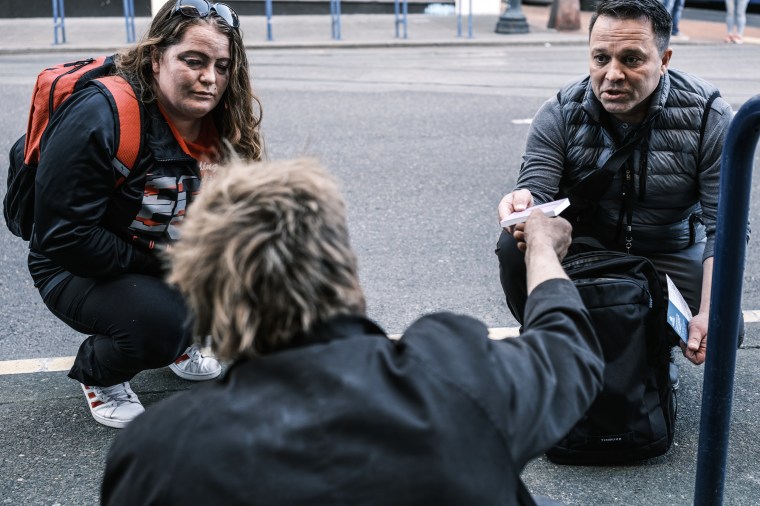
Oregon reverses decriminalization
The new bill would make possession of drugs such as heroin or methamphetamine a misdemeanor, punishable by up to six months in jail.
It would also enable police to confiscate drugs and crack down on their public use by citing people for having even small amounts. Drug treatment is to be offered as an alternative to criminal penalties.
“We are making it clear that Oregon is no longer a drug tourism state,” state Sen. Tim Knopp, R-Bend, said in a statement. “Passing this bill will put Oregon on a path to recovery and signifies an end to the nationwide decriminalization movement.”
Kotek, the governor, said she will sign the legislation but has not provided a timeline.
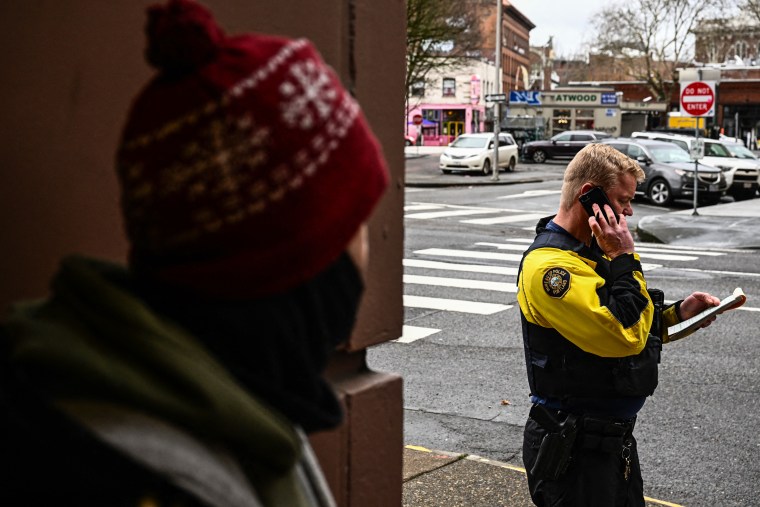
According to an analysis by the Oregon Criminal Justice Commission, which oversees the state justice system, the state could add 1,523 new cases per year under the new bill.
Grant Hartley, the Multnomah County director of Metropolitan Public Defenders, predicted the new citations would overload the system. His office is already short-staffed, with public defenders averaging 100 cases apiece, he said.
"We have a humanitarian crisis," Hartley said. "It's embarrassing to see people out on the street. But injecting thousands more cases into the system is going to make it collapse."
